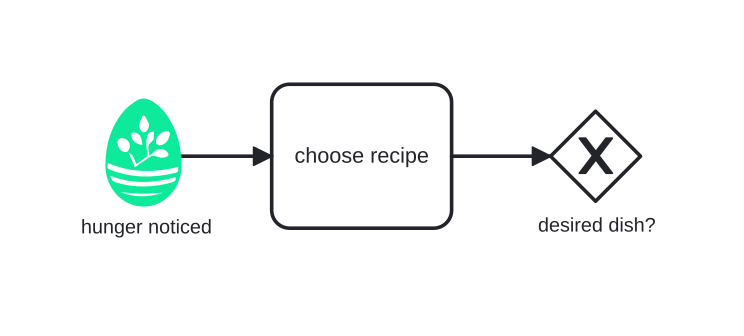April Fools' Notice
This post is a joke and features announced are not part of our mid-term planing and/or official releases. You still think we mentioned something useful? Do not hesitate to give us feedback @bpmn_io or via our project forums.
Today, we announce EBPMN, an improved way to model and communicate your processes. EBPMN (Egg-based Process Modeling Notation) builds upon the successful BPMN 2.0 standard but replaces abstract concepts ("events") with tangible, colorful goods ("eggs"). It increases user engagement with (E)BPMN diagrams and empowers more people to "think in processes".
We propose EBPMN (Egg-based Process Modeling Notation) as a BPMN 2.0 compatible modeling notation and evolution of the BPMN standard. With EBPMN, we support our vision to empower more people to do process modeling and hope to contribute to the larger BPM community.

An EBPMN diagram. Rendered with ebpmn-js, our experimental toolkit to support the standards proposal.
Towards Tangible, Colorful Process Modeling
The EBPMN standards proposal results from many years of user research and experimentation. It aims to address two critical issues that are inherent to BPMN:
- Level of abstraction: BPMN uses numerous abstract concepts ("transaction", "event", "activity"). Such abstractions make it complicated for non-experts to comprehend complex process diagrams. Research suggests that thinking in tangible goods improves "thinking in processes". Hence, EBPMN introduces what we call the "egg".
- Lack of engagement: A complex BPMN process makes a good wallpaper motive. It may transport critical bits of information or the algorithms of your organization, but does so in a surprisingly unagitated, dull manner. Backed by years of feedback, EBPMN adds colors to the core of your processes, raising user engagement and attention span.
While the impact of EBPMN on simple process diagrams is negligible, we found many positive effects on larger diagrams. Our research suggests that EBPMN increases average user satisfaction and stickiness when there is a lot going on:

Modeling a larger EBPMN diagram with ebpmn-js.
Just Another BPMN Dialect?
The initial proposal for EBPMN (0.0.1) builds on top of BPMN in a backward-compatible manner. That means that BPMN engines can execute EBPMN processes without any modifications.
We aim to move fast. Hence, future versions may incorporate additional, backward incompatible changes. Migration between both modeling dialects will always be possible through a SCBAF (swift conversion back and forth) toolkit. A first version of the conversion toolkit will commence soon.
Wrapping Up
This post introduced EBPMN (Egg-based Process Modeling Notation), a standards proposal for next-gen process modeling. It builds upon many years of learning and supports our mission to make great BPM tooling available everywhere, for everyone.
Today, we make EBPMN available as a 751-page specification proposal on GitHub. Along with the proposal, we publish an initial version of ebpmn-js, the first diagram toolkit that supports this novel notation.
We are eager to hear your feedback on Mastodon, GitHub or our forums.
In EBPMN the egg comes first

.
—An excited early adopter.
Are you passionate about JavaScript, modeling, and the web?
Join Camunda and build modeling tools people 